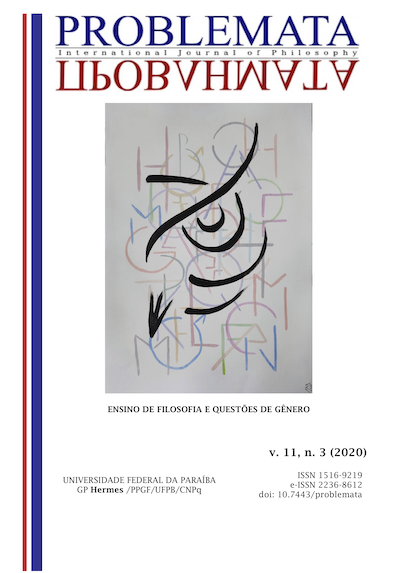PHILOSOPHY IN HIGH SCHOOL:
THINKING ABOUT GENDER IN PUBLIC AND PRIVATE SPACE
DOI:
https://doi.org/10.7443/problemata.v11i3.53758Keywords:
Philosophy, Gender, High SchoolAbstract
This article aims to present new proposals to reflect the gender theme from the teaching of philosophy to high school. Philosophy teaching is not just a curricular necessity, but a great ally for the development of knowledge through the autonomy of thinking, mainly rethinking the new demands that are present and current in Brazilian society, as is the case of philosophy teaching and its gender cut. With this, the school is the public space projected through the logic of differences, enabling the deepening of knowledge through diversity, being the study of gender philosophy, a tool of great prominence, among which we chose some sections to be worked in the classroom with the works of the authors: Sojourner Truth, Silvia Federici, Judith Butler and Djamila Ribeiro, which contribute to understanding issues related to how to think, why to think about gender relations, emphasizing the importance of this philosophical approach for the construction of an inclusive space and participatory in the public space and so that it is possible to take this construction of thinking beyond the school, forming part of the private space of students, family and community in which they live.
Downloads
References
COBELO. Luis. Cozinhando com as muzes, o terceiro sexo do México. Notícia em 05/12/2016. Disponível em https://www.vice.com/pt_br/article/78za3a/cozinhando-com-as-muxes-mexico. Acesso em 30/06/2020.
Documentário Doméstica. Themis - Gênero, Justiça e Direitos Humanos. Duração: 15 minutos. Disponível em: //www.youtube.com/watch?v=BDkAXgGiOoM. Acesso em 29/06/2020
FEDERICI. Silvia. O que eles chamam de amor, nós chamamos de trabalho não pago. Disponível em: https://www.geledes.org.br/o-que-eles-chamam-de-amor-nos-chamamos-de-trabalho-nao-pago-diz-silvia-federici/. Acesso em 26/0/2020.
( ____________). O Ponto zero da revolução, trabalho doméstico, reprodução e luta feminista. Tradução coletivo Sycorax, São Paulo: Elefante, 2019, p. 82.
FERREIRA. Bia. Música Não precisa ser Amélia. Disponível em https://www.letras.mus.br/bia-ferreira/nao-precisa-ser-amelia/. Acesso em 30/06/2020.
LENCIONI. Carlos. 28,9 milhões de famílias no Brasil são chefiadas por mulheres. Notícia em 20/03/2019. Disponível em https://observatorio3setor.org.br/carrossel/289-milhoes-de-familias-no-brasil-sao-chefiadas-por-mulheres/. Acesso em 26/06/2020.
RIBEIRO, Djamila O que é: lugar de fala? Belo Horizonte,MG: Letramento: Justificando, 2017.
ROCHA. Cassio B. A. Um pequeno guia ao pensamento, aos conceitos e à obra de Judith Butler. Cad. Pagu, no.43 Campinas July/Dec. 2014. Disponível em https://doi.org/10.1590/0104-8333201400430507 . Acesso em 26/06/2020.
TRUTH. Sojourner. Eu não sou uma mulher? e outros discursos. Org. Jaqueline Gomes de Jesus. Belo Horizonte: Nandyala, 2019.
Downloads
Published
Issue
Section
License
Authors who publish with this journal agree to the following terms:
- Authors retain copyright and grant the journal right of first publication with the work simultaneously licensed under a Creative Commons Attribution License that allows others to share the work with an acknowledgement of the work's authorship and initial publication in this journal.
- Authors are able to enter into separate, additional contractual arrangements for the non-exclusive distribution of the journal's published version of the work (e.g., post it to an institutional repository or publish it in a book), with an acknowledgement of its initial publication in this journal.
-
- Authors are permitted and encouraged to post their work online (e.g., in institutional repositories or on their website) prior to and during the submission process, as it can lead to productive exchanges, as well as earlier and greater citation of published work (See The Effect of Open Access).





